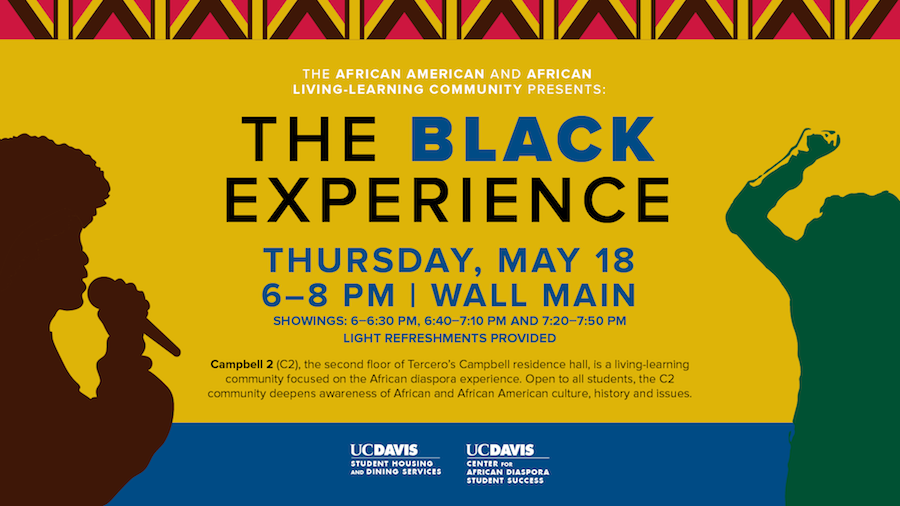
First-year students host “The Black Experience” event
Attempting to encompass what it means to be black, students from the African/African American Living Learning Community and faculty put on their annual event, “The Black Experience,” in the Tercero Residence Halls on May 18.
Kawami Evans, the interim associate director at the Center for African Diaspora Student Success, introduced the event as different from the years prior because the students wanted to use the media to make the event more engaging and interactive. Thus, the show was segmented into five parts: poetry (spoken word), essay, film, discussion and song.
The first segment featured a poem titled “What’s It’s Like?” performed by J’son Jones and Ivanti Tircuit. Through repetition of the phrase “I am told,” the poem identifies stereotypes that come along with the racialization of blackness. Such stereotypes that were highlighted were demeaning and dehumanizing; however, the poem confronts these issues by reverting the phrase into “I am telling you.” This reversion shows how the black student takes a phrase and gains agency by turning it into an educational and powerful weapon.
“I choose poetry because […] it directly expresses emotion in a way that it drives motion into people and it really touches people,” said Jones, a first-year sociology major. “I think it’s good to share our stories because they need to be heard.”
In a segment titled “Honoring Our History” presented by Tircuit, she discussed the importance of black leaders. In fact, Tircuit started by using the first names of black historical figures to show how much weight they have had on the cultivation of black lives and their current standing. However, she attempted to highlight that history lessons only represent black leaders as dead — a fact that confuses her classmates who often ask how knowing about black leaders affects them in their present. To this she responded that Black Americans should know that, without their black historical figures, the present as it exists now would not have a foundation. In a sense, these black historical figures are Black Founding Fathers for the Black American.
“Mixing entertainment with the truth reaches out to more audiences,” Jones said. “[These platforms] adhere to the younger generations, and they’re the ones we are trying to reach because they’re the ones that are going to make the changes.”
Another one of the segments showcased a documentary film called “Dear Black People” by Hisani Stenson. This film attempts to dispel racial stereotypes and racial ignorance toward black people. Students were allowed to anonymously ask questions about black people, which black students would answer. One student stood out by responding to a question about slavery by saying that “Black history does not start with slavery… we were kings, queens, inventors.”
Then, Evans suggested that members of the audience partake in discussion about their first reactions to the film. The project was intended to be collaborative and inclusive.
“Working on this project was about getting to know more people,” said Maya McConnan, a first-year communication and design double major. “It was a community building process; it took a lot of people on the floor to get together. It was really engaging, and we got a lot of freedom in choosing what we wanted to do.”
The final segment of the event was a cover of Kehlani’s song “Bright,” performed by Cortha McNair and Maggie Njugura. The lyrics of the song showcase issues that black children must deal with growing up. The beginning of the song is directed to young black girls: “Little girl, watching her reflection/ As she parts her curls into four sections/ She says, “I don’t look like them, I don’t look like her/ and I don’t want what’s on my head.”
These lyrics highlight only some of the issues of what it’s like to face the world as a young black person. The song directs its lyrics to children in hopes to redefine those laws or regulations that are fed to young black children. The lyrics refocus and attend to self-love versus reinstilling hate in young black children.
When asked how poetry, film, essay and song intersect with the black experience, Osereme Ujadughele, a fourth-year chemical engineering major, said, “I think they intersect because they’re platforms for telling how you feel and because all of those platforms are types of art — they are not all one structure and the black experience can come in many different forms.”
Overall, the event was fun, educational and engaging. One could definitely sense the passion of the first-year students who participated.
“The black experience is different for everyone,” Jones said. “I think the overall black experience is that we are not given the opportunity that we need to survive in this institutional world.”
Written by: Akaylah Ellison — arts@theaggie.org



